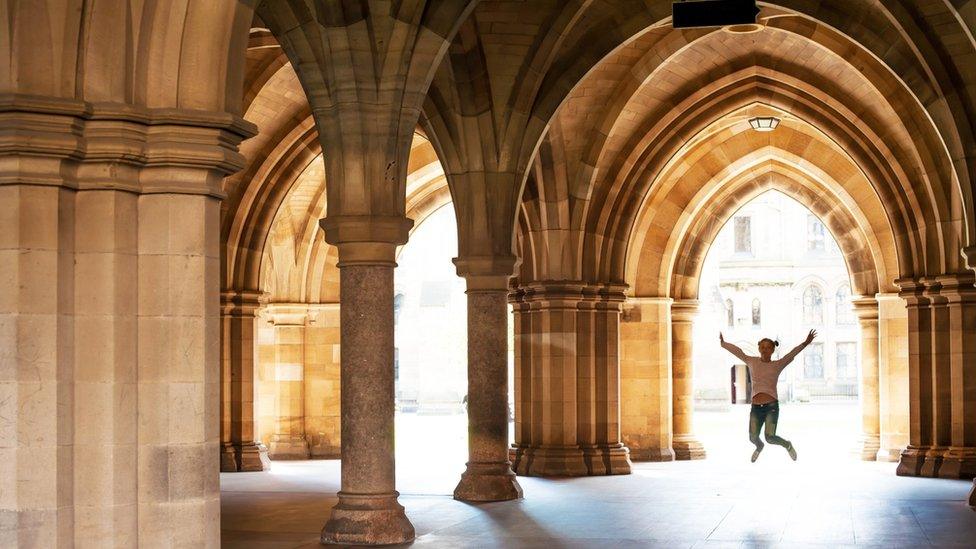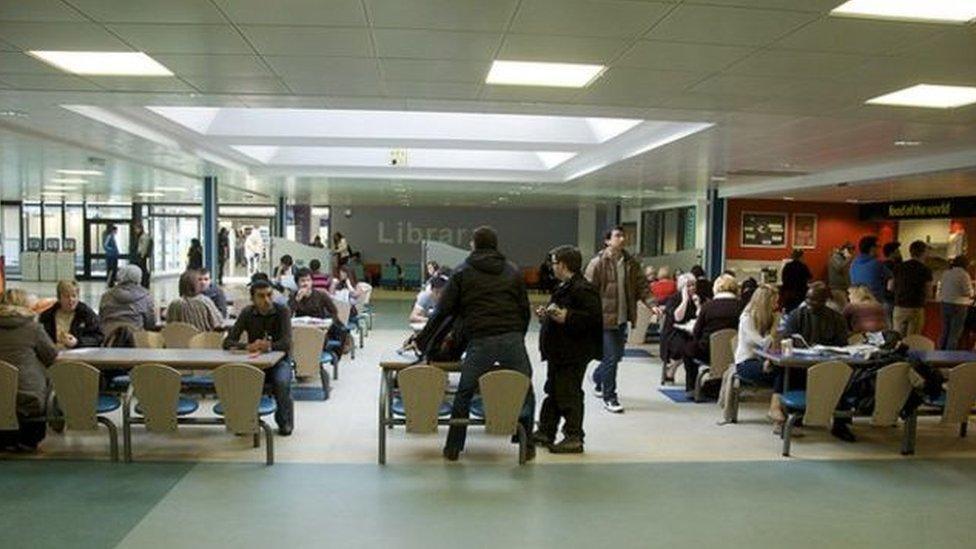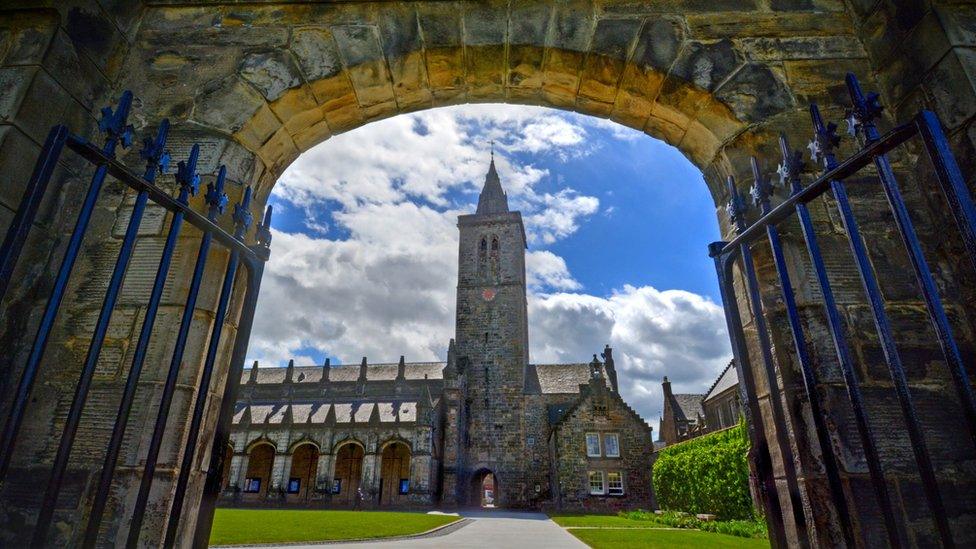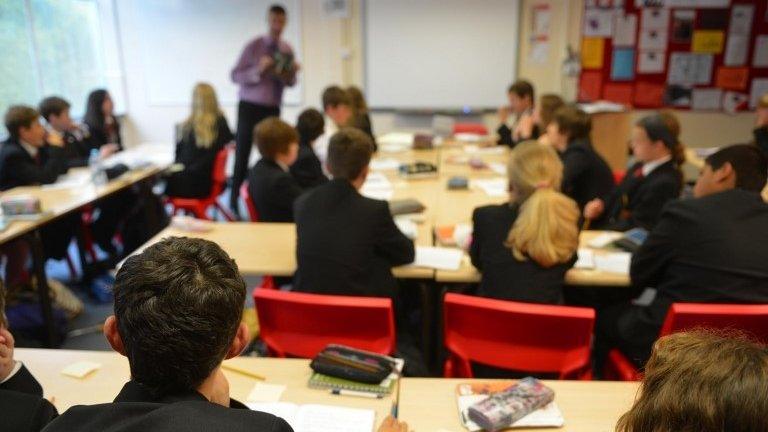Report aims to tackle Scottish university inequality
- Published

Children from Scotland's wealthiest areas are four times more likely to go to university than those from the most deprived areas
A commission has set out 34 recommendations aimed at getting more pupils from deprived backgrounds into higher education in Scotland.
The Commission on Widening Access, external was set up by Nicola Sturgeon in 2014.
Its final report sets out a series of targets, including ensuring that pupils from the 20% most deprived areas make up 20% of Higher Education entrants by 2030.
It also calls for a Commissioner for Fair Access to be appointed.
The report has suggested that university admission thresholds should be lower for students from the most deprived backgrounds than for those from the country's wealthiest areas.
Equal chance
The latest figures from Ucas show that 18-year-olds from Scotland's 20% least deprived communities are more than four times as likely to go to university as those from the 20% most deprived communities.
The gap is mirrored in the school system, with pupils from deprived backgrounds generally performing worse in exams than wealthier pupils.
The Scottish government has said it wants every child, regardless of their background, to have an equal chance of going to university.
It said it would immediately accept the commission's recommended targets, and give "careful consideration" to its other recommendations.
The commission was chaired by Dame Ruth Silver, who said Scotland had a "moral, social and economic duty" to tackle the inequality in its "truly world-class higher education system".
Dame Ruth said her report offered "clear and tangible actions that can be taken", but warned that the public debate around fair access was often "unhelpfully simplistic".
'Systemic unfairness'
She said: "The social, cultural and financial benefits of higher education can be transmitted between generations, breaking cycles of deprivation and contributing to a fairer, more prosperous and inclusive Scotland.
"There is also an economic imperative to ensure Scotland does not miss out on the economic potential of some of our finest talents."
Dame Ruth said the problem was "sophisticated and subtle", rooted in family homes, local communities, and in the "cultural differences" between socioeconomic groups.

The Scottish government wants children from all backgrounds to have an equal chance of going to university
She added: "It is exacerbated by the systemic unfairness evident in the admissions and selection processes of institutions, in the school attainment gap and in the efficiency of transitions between education sectors."
The report said a Commissioner for Fair Access should be appointed by the end of the year, with responsibility for leading efforts to end inequality across the country and publishing an annual report on the progress that has been made.
It said that by 2019 all universities should set access thresholds against which learners from the most deprived backgrounds should be assessed.
These thresholds should be separate to standard entrance requirements and set at a level which "accurately reflects the minimum academic standard and subject knowledge necessary to successfully complete a degree programme".
'Bold and thoughtful'
The report also said students who have been carers should be entitled to the offer of a university place and a full bursary if they meet admissions thresholds.
And it called for a more collaborative approach to delivering access programmes by universities, colleges and schools.
Education Secretary Angela Constance said the report's recommendations were "bold and thoughtful and fit well with ongoing work around closing the attainment gap and developing the young workforce."
She added: "Agreeing to take forward these targets leaves no-one in any doubt that this government is determined to make urgent progress on achieving our ambition of equal access."
Liz Smith from the Scottish Conservatives said that although she too saw the report as "very thoughtful" the recommendations it makes would be difficult for universities.
She explained: "Some students will be required to meet minimum entry requirements to guarantee a place but other students will be required to meet a higher bar of entry.
"This is bound to lead to difficulties for universities and it will certainly put added pressure on higher education funding since more places will have to be made available if no student is to be squeezed out."
Both the National Union of Students Scotland and the University and College Union Scotland welcomed the report.
Scottish Labour also backed the initiatives outlined, saying that anything that" helps to close the gap between the richest and the rest in our education system should be encouraged".
The party opportunities spokesman, Iain Gray, said: "The SNP cannot deny their record. The reality is that spending on education and training has been cut by 10% by the SNP government since 2007.
"That's why there are 4,000 fewer teachers in Scotland's classrooms and why there are 152,000 fewer college places. Meanwhile the attainment gap between the richest and the rest remains as stubborn as ever."
- Published13 November 2015

- Published3 November 2015
